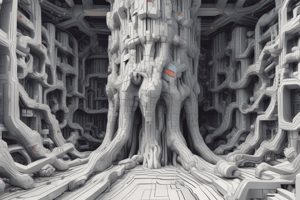Podcast
Questions and Answers
What may accumulate due to reduced capacity to shift attention away from uncomfortable intrusions?
What may accumulate due to reduced capacity to shift attention away from uncomfortable intrusions?
- Rage and annoyance (correct)
- Excitement and curiosity
- Joy and fulfillment
- Calmness and tranquility
How do individuals with schizophrenia perceive their actions and intents when passivity phenomena occur?
How do individuals with schizophrenia perceive their actions and intents when passivity phenomena occur?
- As internally generated and motivated
- As influenced by their past experiences
- As irrelevant to their consciousness
- As originating from an external source (correct)
What cognitive process is thought to be disturbed in schizophrenia?
What cognitive process is thought to be disturbed in schizophrenia?
- Memory retention and recall
- Emotional regulation and control
- Feedback on intentions and plans (correct)
- Visual perception and clarity
What is a common symptom of depression related to attention?
What is a common symptom of depression related to attention?
In patients with anxiety disorders, attention is often characterized by which of the following?
In patients with anxiety disorders, attention is often characterized by which of the following?
How does attention contribute to goal-oriented situations?
How does attention contribute to goal-oriented situations?
What aspect of perceptual organisation does not require attention according to research?
What aspect of perceptual organisation does not require attention according to research?
What phenomenon does the 'Cocktail party problem' demonstrate?
What phenomenon does the 'Cocktail party problem' demonstrate?
According to Broadbent's filter model, what happens to information before it is filtered?
According to Broadbent's filter model, what happens to information before it is filtered?
What does Mackay's experiment suggest about unattended information?
What does Mackay's experiment suggest about unattended information?
What is 'attentional bias' best described as?
What is 'attentional bias' best described as?
Which area of the brain is involved in attention and information processing?
Which area of the brain is involved in attention and information processing?
Which test is commonly used for assessing selective attention?
Which test is commonly used for assessing selective attention?
Which type of hallucination is more likely to be associated with typical or organic pathology?
Which type of hallucination is more likely to be associated with typical or organic pathology?
What is a significant characteristic of auditory hallucinations according to the findings?
What is a significant characteristic of auditory hallucinations according to the findings?
Which cognitive components were found to be most impaired in patients with chronic schizophrenia?
Which cognitive components were found to be most impaired in patients with chronic schizophrenia?
What can be a cause of delusions in individuals with schizophrenia?
What can be a cause of delusions in individuals with schizophrenia?
How is attention defined in the context of our perceptual system?
How is attention defined in the context of our perceptual system?
What impact do hallucinations have on cognitive functioning according to the findings?
What impact do hallucinations have on cognitive functioning according to the findings?
What is thought to occur when individuals with schizophrenia process sensory input?
What is thought to occur when individuals with schizophrenia process sensory input?
What cognitive deficiency is particularly noted in how schizophrenic individuals respond to faces?
What cognitive deficiency is particularly noted in how schizophrenic individuals respond to faces?
What is the purpose of the Conners CPT 3?
What is the purpose of the Conners CPT 3?
What does spatial attention involve?
What does spatial attention involve?
What do cognitive illusions reflect according to Dehaene et al. (2006)?
What do cognitive illusions reflect according to Dehaene et al. (2006)?
What was the conclusion of the classical Sperling paradigm?
What was the conclusion of the classical Sperling paradigm?
How does human perception function according to Gregory (2009)?
How does human perception function according to Gregory (2009)?
What is the role of 'top-down' cognitive processing in the brain?
What is the role of 'top-down' cognitive processing in the brain?
In what way can emotional states affect hallucinations?
In what way can emotional states affect hallucinations?
What did Dewi Rees' study (1971) indicate about the context of hallucinations?
What did Dewi Rees' study (1971) indicate about the context of hallucinations?
Flashcards
Attention
Attention
The ability to focus on specific information and ignore irrelevant details. It's crucial for processing information efficiently.
Hallucinations
Hallucinations
A mental state involving false perceptions or experiences, such as hearing voices or seeing things that aren't there.
Visual Hallucinations
Visual Hallucinations
A type of hallucination involving seeing things that aren't real.
Auditory Hallucinations
Auditory Hallucinations
Signup and view all the flashcards
Schizophrenia
Schizophrenia
Signup and view all the flashcards
Inhibitory Control
Inhibitory Control
Signup and view all the flashcards
Sustained attention
Sustained attention
Signup and view all the flashcards
Delusions
Delusions
Signup and view all the flashcards
Cocktail Party Problem
Cocktail Party Problem
Signup and view all the flashcards
Broadbent's Filter Model
Broadbent's Filter Model
Signup and view all the flashcards
Mackay's Experiment
Mackay's Experiment
Signup and view all the flashcards
Attentional Bias
Attentional Bias
Signup and view all the flashcards
Detection Threshold
Detection Threshold
Signup and view all the flashcards
Visual Probe Technique
Visual Probe Technique
Signup and view all the flashcards
Continuous Performance Test (CPT)
Continuous Performance Test (CPT)
Signup and view all the flashcards
Reduced Attention Shifting in Schizophrenia
Reduced Attention Shifting in Schizophrenia
Signup and view all the flashcards
Disturbed Feedback Mechanism in Schizophrenia
Disturbed Feedback Mechanism in Schizophrenia
Signup and view all the flashcards
Passivity Phenomena in Schizophrenia
Passivity Phenomena in Schizophrenia
Signup and view all the flashcards
Attention Deficit Hyperactivity Disorder (ADHD)
Attention Deficit Hyperactivity Disorder (ADHD)
Signup and view all the flashcards
Depression and Attention
Depression and Attention
Signup and view all the flashcards
Conners CPT 3
Conners CPT 3
Signup and view all the flashcards
Spatial Attention
Spatial Attention
Signup and view all the flashcards
Spatial Attention Tasks
Spatial Attention Tasks
Signup and view all the flashcards
Cognitive Illusion
Cognitive Illusion
Signup and view all the flashcards
Top-down Processing
Top-down Processing
Signup and view all the flashcards
Hallucinations & Emotional State
Hallucinations & Emotional State
Signup and view all the flashcards
Rees' Study (1971)
Rees' Study (1971)
Signup and view all the flashcards
Study Notes
Information Processing and Attention
- Research debates whether perceptual organization relies on attention.
- Goal-oriented situations involve deliberate attention to gather information for achieving goals.
- Kimchi et al (2007) studied whether perceptual organization occurs without attention.
- Certain aspects of perceptual organization (e.g., figure-ground differentiation) can occur without attention; others depend on attentional processing.
- This contradicts traditional theories that attention isn't crucial for perceptual organization.
Models of Attention
- Cocktail Party Problem: People can focus on one conversation in a noisy environment.
- Broadbent's Filter Model: Information is filtered in short-term memory, with the selected information further processed.
- MacKay's Experiment: Information not attended is still perceived (though not necessarily recalled).
- Attentional Bias: Ability to prioritize important stimuli even when focused elsewhere.
Measuring Attention
- Various techniques (e.g., visual probe technique, continuous performance test (CPT), spatial attention tasks) exist to measure attention.
- CPT is frequently used to assess attentional deficits including ADHD.
Illusions
- Cognitive illusions reflect observer overconfidence in perceiving all visual information.
- Sperling's paradigm demonstrated limited visual information capturing abilities.
- Illusions aren't errors in the perceptual system. Instead, they're mechanisms to enhance processing of sensory/visual information.
Hallucinations
- Hallucinations can be influenced by emotional state often mirroring the anxieties and concerns experienced.
- Hallucinations can be influenced by stress, illness and mood, especially in the case of grief.
- Psychotic disorders are not generally considered linked to hallucinations.
- Visual and auditory hallucinations can be related to structural brain changes.
Attention in Schizophrenia
- Attention is a crucial cognitive process affecting information gathering and rapid processing of sensory information.
- Schizophrenic patients display impaired performance on attention tasks (e.g., lower scores on attention scales).
- Facial expressions are processed differently in schizophrenic individuals.
- Reduced ability to shift away from irrelevant stimuli and fixate on irrelevant aspects of stimuli are common problems.
- Delusions and hallucinations may be linked to attentional malfunction, incorporating irrelevant information and memories.
Attention in Other Disorders
- ADHD: Attention deficits are common and involve error types that differ to controls.
- Depression: Poor memory and reduced concentration are related to attentional deficits.
- Anxiety: Heightened attention is frequently noted, but with reduced impulsivity and increased inhibition.
Studying That Suits You
Use AI to generate personalized quizzes and flashcards to suit your learning preferences.




